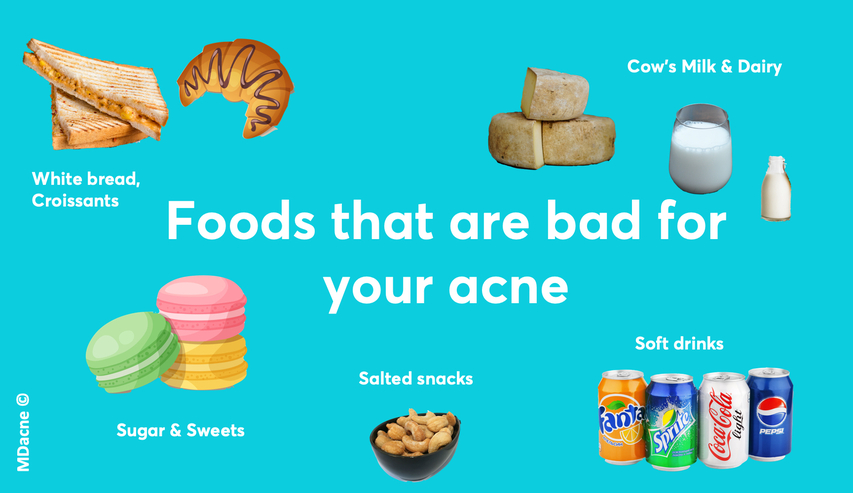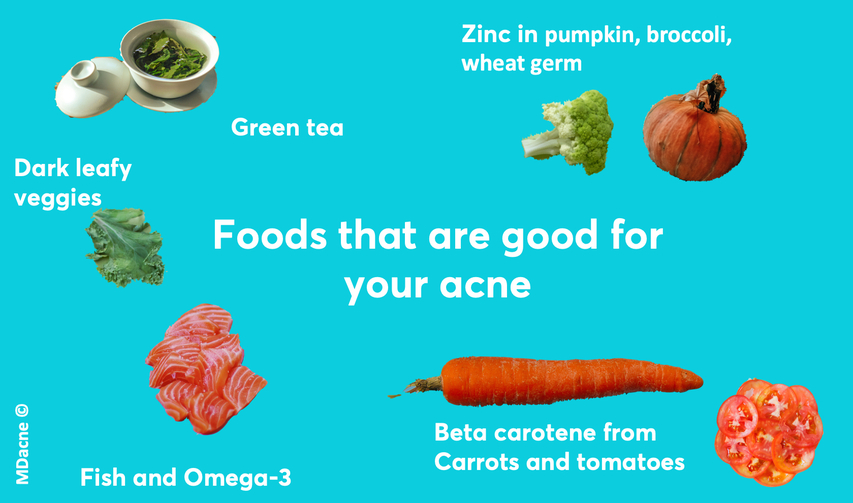Which food causes acne?

There’s often debate around whether diet truly impacts acne and skin conditions. However, recent studies suggest that diet can play a significant role in acne development. Based on clinical research, here are some dermatologist-approved insights for an acne-friendly diet.
Foods That Can Trigger Acne
Research indicates that certain foods may worsen or trigger acne breakouts. Here’s a look at some of the primary dietary culprits:
Dairy Products
Milk, cheese, and other dairy products can stimulate the overproduction of male hormones called androgens, which are linked to acne. Removing dairy from your diet may help reduce inflammation, redness, and breakouts. Among dairy products, cow’s milk—especially low-fat varieties—has been linked most strongly to acne, likely due to higher sugar content and progesterone-like hormones. A study in the Journal of the American Academy of Dermatology found that individuals with acne were more likely to consume low-fat or skim milk.
Processed Foods
Many processed foods, such as cereals, sweets, fried foods, and white bread, have a high glycemic index, meaning they spike blood sugar and insulin levels. These quick sugar surges can lead to an increase in growth hormones, which cause sebaceous glands to enlarge and produce more oil, leading to breakouts. High-glycemic foods should be limited or avoided in those with acne-prone skin.
High Glycemic Foods to Avoid:
- Bread products: White bread, bagels, muffins, cakes
- Sugary cereals: Corn flakes, rice crisps, sugary granola
- Instant cereals: Sweetened oatmeal
- Sweet fruits: Melons, pineapples, apricots, sweetened dried fruits
- Starches: White potatoes
- White grains: White rice, pasta
- Processed snacks: Pretzels, rice cakes, chips, crackers
- Desserts: Candy, ice cream, milk chocolate, cakes
- Dairy: Milk, cheese, yogurt
Brewer’s Yeast
Brewer’s yeast, used in bread, pizza dough, and other baked goods, has been found to trigger acne in some individuals. It is also present in products like beer, vinegar, soy sauce, tempeh, and certain pickled foods. Avoiding these may help improve skin clarity.

Foods That Support Clear Skin
Opting for a diet rich in whole, nutrient-dense foods can support skin health and reduce acne symptoms. Here are some beneficial, anti-inflammatory options:
Low Glycemic, Anti-Inflammatory Foods
- Whole Grains: Whole-grain bread, oats, barley
- Legumes: Chickpeas, lentils
- Low-GI Starchy Vegetables: Sweet potatoes
- Low-GI Fruits: Green apples, pears, plums, grapefruit
- Fish: Mackerel, salmon, sardines, tuna (all rich in omega-3s)
- Leafy Greens: Spinach, kale, romaine lettuce
- Lean Protein: Grass-fed turkey, chicken, eggs
- Seeds: Flaxseeds, chia seeds, hemp seeds
- Complex Carbs: Wild rice, quinoa, beans, peas
These foods help reduce inflammation, regulate blood sugar, and prevent the hormone surges that can lead to breakouts.

Vitamins and Supplements for Acne-Prone Skin
While a balanced diet is the foundation for clear skin, certain supplements may provide additional support, particularly for those struggling with acne.
-
Vitamin B5 (Pantothenic Acid): Essential for managing sebum production. Deficiency in B5 can lead to oily skin and hormonal acne. Research suggests that individuals with severe acne who took B5 supplements experienced significant skin improvements.
-
Vitamin A: Known for its role in cell growth and immune support, vitamin A aids in the development of skin cells. You can get it from beef liver, fish, leafy greens, orange/yellow vegetables, or as a supplement.
-
Zinc: Important for skin, hair, and nail health, zinc also boosts immune function and supports wound healing. Studies suggest oral zinc may help reduce acne symptoms, especially in adults and those with cystic acne. Zinc is naturally found in seafood, poultry, beans, and nuts.
Natural Vegetable Extracts for Hormonal Acne
For women with hormonal acne, cruciferous vegetables (also known as Brassica vegetables) are particularly beneficial. This group includes kale, Brussels sprouts, alfalfa, spinach, broccoli, and cauliflower. These vegetables contain DIM (Diindolylmethane), a compound that helps balance estrogen and may reduce hormone-related breakouts. DIM supplements can also be effective for women managing hormonal acne.
What to Drink for Clear Skin
Staying hydrated is essential for skin health. Water is the best choice, helping flush toxins from the body and keep skin cells hydrated. Green tea, rich in antioxidants, is another excellent option that can benefit skin clarity. Black coffee in moderation is generally safe, though it’s best to monitor caffeine intake as it can sometimes exacerbate stress-related breakouts.
Conclusion
An acne-friendly diet is often intuitive, focusing on whole foods, lean proteins, vegetables, and low-glycemic carbohydrates. However, it’s important to remember that while diet is a powerful tool, it’s just one part of an acne treatment plan. Combining dietary adjustments with a personalized skincare routine and, when necessary, clinical treatment, offers the best results for clearer, healthier skin.
References
- The significance of diet in treated and untreated acne vulgaris
- A randomized, double-blind, placebo-controlled study of a novel pantothenic Acid-based dietary supplement in subjects with mild to moderate facial acne
- The relationship of diet and acne
- Implications for the role of diet in acne
To find the right acne treatments for your unique skin, take the free skin assessment by clicking here.



